World War II: Bomb manual for Churchill's 'secret army'
- Published
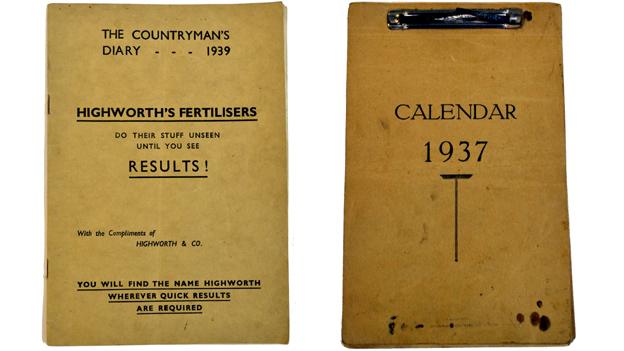
On first glance, the manuals appear to be a mundane countryside diary and calendar
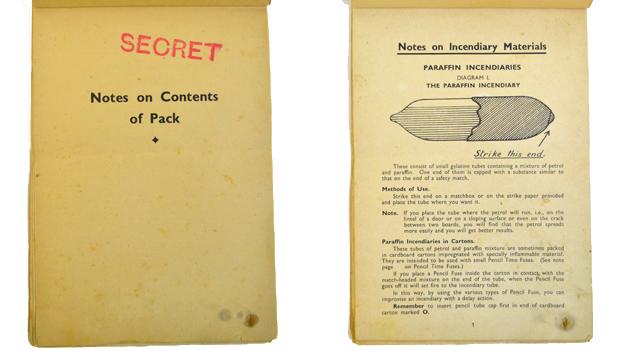
However, inside there is top-secret information on how to use a variety of explosives.
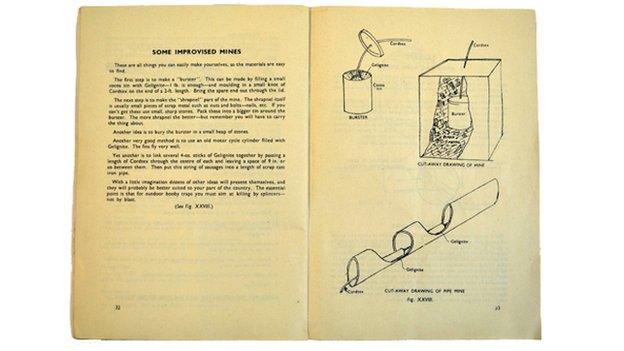
There is also guidance on how to use everyday household items to fashion bombs.
They were Winston Churchill's "secret army", tasked with causing havoc behind enemy lines had the Nazis invaded during World War II. But keeping the identities of the Auxiliary Unit members a secret was crucial to their survival. One of the ways was by hiding bomb-making manuals in plain sight, disguised as old calendars and diaries.
Its cover promises agricultural fertilisers that "do their stuff unseen until you see results".
But turn the page and a comprehensive guide on where to plant explosives and how to make your own bombs is revealed.
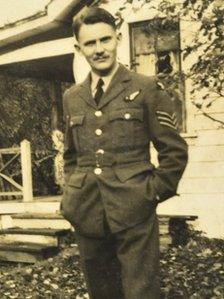
Louis Pugh joined the RAF after his unit was disbanded
The Countryman's Diary 1939 is one of two manuals being auctioned later which shed light on the training and abilities of the guerrilla units.
Sponsored by Highworth's Fertilisers - a fictional company named after the Wiltshire town near where the units trained - the diary gives advice on how to set booby traps and kill German troops using household items.
It was owned by Louis Pugh who commanded a unit in Tenterden, Kent.
The units were formed in 1940 following the Dunkirk evacuation when Churchill became convinced that invasion was imminent.
The cells, recruited mainly from men of the Home Guard, were trained to operate independently and sabotage German supply lines as they invaded.
The trained killers - who would have become the British resistance movement - were also expected to carry out assassinations.
'Killing through splinters'
As the owner of a chemical factory, Pugh was deemed suitable to lead a unit that would specialise in using explosives.
After training in Wiltshire, he recruited his unit from trusted local men, built a base at Gibbets Oak Farm and stocked it with weaponry.
However, according to Jeannette May, senior valuer at Eastbourne Auction Rooms where the manuals are being sold, it had to be abandoned quickly.
"It was discovered by a couple of courting lovers who went past and found it," she said.
"Pugh took everything back to his house and stored it, while they built a second base.
"However, he had a young family at the time and was really worried about the repercussions, for his family and village, if the Germans had invaded and discovered it.
"It was estimated that the life expectancy for a member of one of the units - had the Germans landed - would've been 10 to 14 days."
The manuals are being sold alongside photographs, three booby trap mechanisms and several medals. As the rarest items, the manuals are expected to fetch the most, between £500 and £800.
'Secret until death'
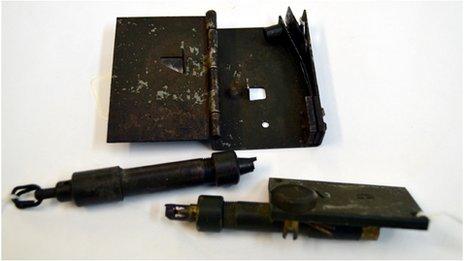
Three booby trap mechanisms held by Mr Pugh are also being sold
Mrs May said the mundane nature of the covers would have been thought about at some length.
She said: "Perhaps they chose 1937 as the date as they imagine a German sifting through possessions in 1940 would ignore it."
Inside, there is matter-of-fact advice on how to kill effectively using home made bombs in cocoa tins.
It reads: "The essential point is that for outdoor booby traps you must aim at killing by splinters - not by blast. Another very good method is to use an old motorcycle cylinder filled with gelignite. The fins fly very well."
After the threat of invasion passed, the units were disbanded, with Pugh joining the RAF and becoming Flt Lt Pugh. He died in 1984.
Mrs May said the items had been handed to the auction house by his stepson, but little else is known about his time with his unit.
"Many of them kept it a secret until their deaths - they just wouldn't talk about it," she said.
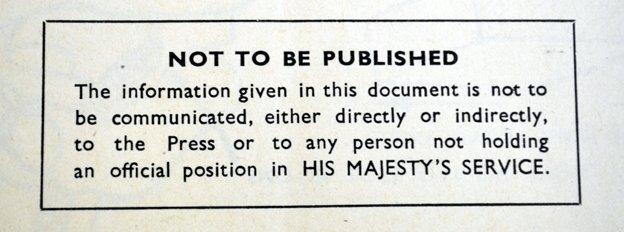
- Published16 March 2013
- Published21 November 2011
- Published23 July 2010
- Published2 April 2011